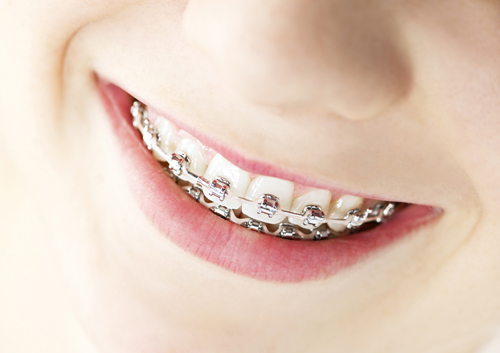February 28th, 2024

Straighter teeth is something many people desire. A nice smile is one of the most attractive things about a person. However, wearing a mouth full of braces for two, three, or more years can be a major pain, both literally and figuratively.
Luckily, there is another option. Invisalign is an alternative to traditional braces. Learn more about the benefits Invisalign offers and why you should consider this exciting method of straightening teeth.
- When you have straight teeth, your mouth is healthier in general and there is less chance of tooth decay and gum disease. Invisalign makes it possible for more people to straighten their teeth.
- Invisalign is essentially invisible. You can straighten your teeth without unsightly metal in your mouth.
- The average cost is similar to that of traditional braces, which makes it affordable for many families.
- With Invisalign, the aligner trays are smooth and comfortable to wear. Traditional metal braces can be uncomfortable and cause irritation to the mouth.
- Invisalign is removable, so you do not have to wear the system during special occasions, or when you’re eating. With normal metal braces, you are stuck with them for the entire straightening process.
- Brushing and flossing are simple. Since the system is removable, you can brush and floss just like normal.
As you can see, Invisalign is an exciting option we provide at Suburban Orthodontics for those who want straighter teeth. If this is something that sounds interesting to you, talk to Dr. Jason Jones and find out if it would work for your particular situation. Get started today, and before you know it you will be enjoying your straighter teeth.
For more information about Invisalign, or to schedule an initial consultation with Dr. Jason Jones, please give us a call at our convenient Buffalo, Hamburg or Amherst office today!
February 21st, 2024

You have done a lot of work to get the perfect smile. You wore your Invisalign aligner trays and cared for your teeth, and now your treatment is done. You still need to take care of your teeth to keep your beautiful smile. Keeps these things in mind when you think about your oral care routine.
Retainers
Many patients do require a retainer after Invisalign treatment. This will be based on your unique situation. If a retainer is recommended by Dr. Jason Jones, use it as directed. Retainers prevent your teeth from shifting back into their original position. You should also avoid hard, crunchy foods for the first couple of weeks as your teeth adjust. For younger patients, retainers are normally used until the wisdom teeth come in or are extracted.
Brushing and Flossing
Brushing and flossing must be part of your daily oral care. Flossing helps remove the plaque, which becomes tartar or calculus. This build up can lead to gingivitis and gum disease. Your gums may be more sensitive for a week or two after your orthodontic work is completed. A warm salt water rinse may relieve discomfort.
Your teeth may be slightly sensitive for a short time. They have been protected by your Invisalign aligner trays and now are fully exposed. You might want to try a sensitive toothpaste to get through the transition. Just ask; we will be glad to recommend the best type for your needs. If your teeth are stained, a professional whitening treatment can be considered.
Regular Dental Checkups
You still need to have regular dental exams. Professional cleanings and X-rays make sure that both your teeth and gums stay healthy so you can keep your teeth for life. If cavities or other problems are found, they can be taken care of quickly.
If you have any questions about how to care for your teeth after your Invisalign program, please ask our Buffalo, Hamburg or Amherst team. We want you to keep your healthy smile and enjoy the results of your Invisalign treatment.
February 14th, 2024

The Valentine shopping list is traditional and simple: Flowers. Candy. But if your Valentine is in braces this year, suddenly your choices become more complicated. No need to worry! Dr. Jason Jones and our Buffalo, Hamburg or Amherst team have some sweet suggestions that are both braces-friendly and Valentine-approved.
First, let’s look at some options where Cupid’s arrow has missed the mark.
- Caramels—these sticky treats are difficult to clean from orthodontic work, and sticky, chewy foods can even cause damage to wires and brackets.
- Chocolate covered nuts—hard foods such as nuts can break or bend wires and brackets.
- Assorted chocolates—a confectionary minefield! There are bound to be some caramels and nuts in there somewhere, hiding beneath an innocent coat of chocolate, just waiting to ruin your Valentine’s evening.
- Other candies such as taffy, licorice, hard candy? No, no, and no. Remember, anything sticky, chewy, or hard is on the “Loves Me Not” list.
So, which chocolate treats won’t break hearts or braces?
- Soft truffles—if it’s not Valentine’s Day without a be-ribboned box of chocolates, choose soft truffles to fill it.
- Chocolate mousse—the perfect end to a romantic dinner.
- Chocolate covered strawberries—it’s a special occasion treat that won’t mistreat braces.
- Rich chocolate cake—always a delightful indulgence, and even better if it’s in the shape of a heart.
If your Valentine is not a chocolate fan, there are other sweet treats that are delicious alternatives.
- Cheesecake can be topped with (pitted!) cherries to celebrate in holiday-appropriate color.
- Soft heart-shaped cookies will be even more romantic with decorative icing—add your initials for a personal touch.
- Select an array of frozen yogurt, ice cream, or gelato in different shades of pink.
- Macarons also come in a variety of pink and red shades—but make sure this confection is on your Valentine’s braces-friendly list!
Of course, you can celebrate the day without sugary tributes. A single flower, watching your favorite movie together or, best of all, a heartfelt card or letter are all wonderful ways to show you care. But if it’s just not the same holiday without a sweet treat, try some of our suggestions. Your Valentine will appreciate your thoughtfulness.
February 7th, 2024

In recent years, many links have been established between orthodontic treatments and whole body health. According to the National Institute of Dental and Craniofacial Research, researchers have observed that people with gum disease are more likely to develop heart disease or experience difficulty controlling blood sugar than people without gum disease. While researchers continue to find associations between oral health and the overall health of the body, as of yet it hasn’t been determined whether gum disease is the sole cause of these health conditions. What can be determined, however, is that good oral health isn't just about maintaining a healthy smile; it has an impact on the health of your entire body.
The associations between gum disease and whole body health
The links between the health of your mouth and the health of your body are too many to ignore. Is it a coincidence that gum disease and other health problems occur together? Researchers don’t think so, despite the lack of definitive proof.
Here are four possible connections between the health of your mouth and the health of your body.
- Excessive oral inflammation has been linked to a greater incidence of clogged arteries.
- The American Society of Microbiology has revealed that certain types of oral bacteria can infect the arterial cells and weaken the wall of the heart.
- Loose teeth are often believed to be a warning sign for osteoporosis, a disease that causes the bones to become less dense.
- Some studies suggest women with gum disease are more likely than those without gum disease to deliver preterm, low-weight babies.
Orthodontics and gum disease
So what does undergoing orthodontic treatment at Suburban Orthodontics have to do with gum disease? Braces do so much more than give you a nice-looking smile. Quite simply, straight teeth are easier to keep clean than crooked teeth. Your toothbrush is able to remove more plaque-causing bacteria, and your floss is more effective at ridding tiny particles between your teeth.
Despite the lack of hard facts in these findings, the message is clear: If you improve your oral health, you will also have a greater chance of maintaining the health of your entire body. And that’s a chance Dr. Jason Jones and our team at Suburban Orthodontics believe is worth taking. For more information about this topic, please give us a call at our convenient Buffalo, Hamburg or Amherst office or ask Dr. Jason Jones during your next visit!





